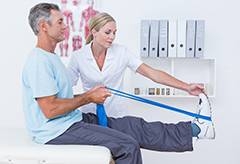Tips on Exercising After TJR
Medically Reviewed by Nigel A. R. Watt, MD
Exercise is a key to successful recovery after a knee or hip joint replacement. The goals are simple, but essential:
- Rebuild muscle strength.
- Prevent stiffness of the new joint.
- Increase motion to regain, as nearly as possible, normal movement.
“We may recommend or refer you for physical therapy following surgery,” says Orthopedic surgeon Nigel Watt, MD. “Follow their advice, perform the exercises correctly and you may be able to say, as one recipient noted, ‘The only sign that my hip was replaced is the alarm that goes off at airport security.’”
WORKING WITH A PHYSICAL THERAPIST
Your team will probably have you up, walking around and climbing steps the day of or day after your surgery.
Physical therapists will work with you on some of the following exercises immediately after your knee joint replacement:
- Straight leg raises
- Ankle Pumps
- Knee Straightening
- Knee Bends (either sitting, supported or non-supported)
- Stairs (going up and down)
Right after hip joint replacement, these exercises may be recommended:
- Ankle Pumps
- Supported Knee Bends
- Abduction Exercises
- Leg Raises
- Stairs (going up and down)
After phase one, you may add some resistance to build muscle strength faster. This could involve adjustable equipment in a fitness center or large stretchable bands or tubes that you can use at home.
MORE YOU CAN DO ON YOUR OWN
Keep walking. It’s OK to use your cane until you’ve regained your balance and enough muscle strength to feel comfortable. Start with 5 or 10 minutes two to four times a day. Eventually, move up to 20-30 minutes 2 or 3 times day.
Exercises you can undertake on your own include riding a stationary bike and swimming. Some therapists will tell you to start by pedaling backward on the bike at first. Then, switch for forward pedaling.
Swimming and water exercise are good because the water’s buoyancy lessens downward stress off the muscles, while the friction of the water when exercising helps build muscle.
WATCH OUT FOR THESE
Exercises to avoid include jogging, because it puts excess stress on the joints, and singles tennis, because of the extreme stops and starts.
FINAL THOUGHT
A survey of literature on exercise following total joint replacement concluded that it’s wise to be more conservative after knee joint replacement than after hip replacement.
Find an Orthopedic Specialist near you.
Sources include: McLeod Health, National Institutes of Health, Psychology Today, American Academy of Orthopaedic Surgeons
-
McLEOD REGIONAL MEDICAL CENTER FLORENCE
843-777-2000 -
McLEOD DARLINGTON
843-777-1100 -
McLEOD DILLON
843-774-4111 -
McLEOD LORIS
843-716-7000 -
McLEOD SEACOAST
843-390-8100 -
McLEOD CHERAW
843-537-7881 -
McLEOD CLARENDON
803-433-3000



-
McLEOD REGIONAL MEDICAL CENTER FLORENCE
843-777-2000 -
McLEOD DARLINGTON
843-777-1100 -
McLEOD DILLON
843-774-4111 -
McLEOD LORIS
843-716-7000 -
McLEOD SEACOAST
843-390-8100 -
McLEOD CHERAW
843-537-7881 -
McLEOD CLARENDON
803-433-3000
 Find a Doctor
Find a Doctor  Locations
Locations  Services
Services 